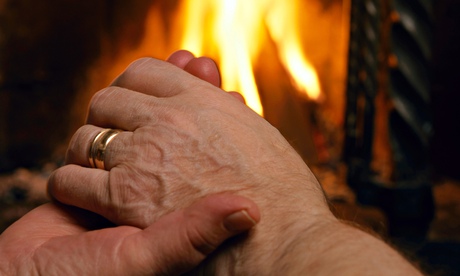
A sizeable minority of men and women are still sexually active into their 80s, according to a study which debunks the myth that older people no longer have sex.
Older men are getting more action than women, however, and a survey says they are almost three times as likely to masturbate. Women are 10 times as likely as men to feel “obligated” to have sex in their twilight years, finds the survey, entitled English Longitudinal Study of Ageing (Elsa).
Just over 31% of the 80- to 90-year-old men surveyed in England had sex or masturbated in the last year, compared with 59% of those in the 70-79 age group.
Among women in the same age brackets, the figures were 14% and 34% respectively, though more than 41% of 80- to 90-year-old women who lived with a partner reported some sexual activity in the previous year.
A total of 6,201 people in England aged 50 to 90 answered questions about their sexual activity as part of the Elsa project. Unlike other similar studies, none of the respondents had been recruited specifically to discuss their sex lives, suggesting the results could be more reliable than most. It is also believed to be the first time in England that over-80s have been asked about their sexual behaviour in an academic study.
Researchers from the University of Manchester found that, contrary to popular conceptions, health and relationship problems were more closely linked to decreasing sexual activity and functioning, rather than simply advancing age.
The paper, whose main author was David Lee, an Age UK research fellow at the university’s school of social sciences, is published in the American academic journal, Archives of Sexual Behavior.
Lee said: “This is the first nationally representative study to include people over the age of 80 when asking older men and women in England about their sexual health. We hope our findings improve public health by countering stereotypes and misconceptions about late-life sexuality, and offer older people a reference against which they may relate their own experiences and expectations.
“Our research is also highlighting the diversity of late-life sexualities, and trying to impose youthful norms of sexual health on older people would be over-simplistic and even unhelpful. It is, however, important that health professionals act on this and are more open about discussing sexual health with older people – it can’t simply be assumed to be an irrelevance.”
Problems most frequently reported by sexually active women among the 50- to 90-year-olds surveyed related to becoming sexually aroused (32%) and achieving orgasm (27%), while for men it was erectile difficulties (39%). Chronic health conditions and poor self-rated health seemed to have more obvious negative impacts on the sexual health of men than women.
Men were more concerned about their sexual activities and function than women and, with increasing age, these concerns tended to become more common. Sexually active women were less dissatisfied with their overall sex lives than men, and also reported decreasing levels of dissatisfaction with increasing age.
The study also found that many septuagenarians and octogenarians were still affectionate towards their partners, with 31% of men and 20% of women reporting frequent kissing or petting. Among those who reported any sexual activity in the past three months, 1% of men and 10% of women reported that they felt obligated to have sex.
Just over 44% of men in the study masturbated frequently, compared with only 15.9% of women. Viagra or other erection enhancing drugs were used by just over 7% of men, half of whom reported satisfaction with the results, said Lee.
In a further study, soon to be published, Lee found that most older people said they still felt sex was an important part of being in a relationship. “When we asked whether satisfactory sexual relations were essential to the maintenance of long-term relationships, just over two-thirds of men and just under two-thirds of women agreed,” said Lee.
Caroline Abrahams, charity director at Age UK, said: “The fact this is the first time that people over 80 years old have been included in this kind of research highlights how often the public health needs of older people, including sexual health, are ignored or overlooked. With an ageing population it is important that providers of sexual health services understand the needs of older people in both clinical settings and when developing information and advice. These recent findings now need to be used to improve sexual health advice and information for older people.”

